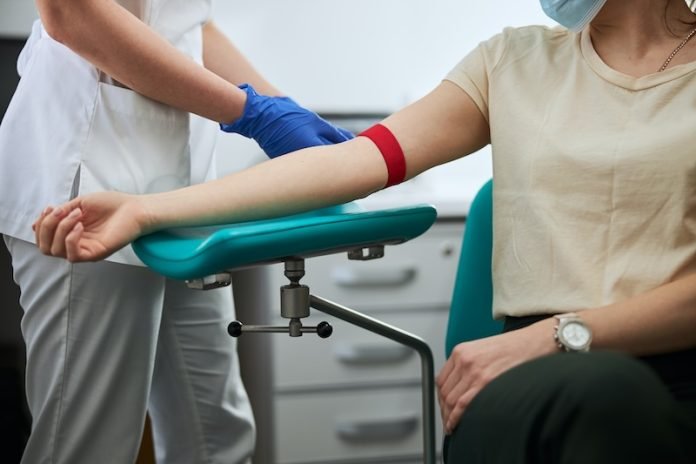
Cancer’s stealthy progression, often devoid of noticeable symptoms until advanced stages, poses a significant challenge in its early detection and treatment.
Among the malignancies known for their silent development are ovarian and gastroesophageal cancers.
To address this issue, an international research team, including scientists from The Rockefeller University’s Laboratory of Cellular and Structural Biology, has unveiled a highly sensitive blood test capable of detecting a crucial cancer-related protein, LINE-1-ORF1p, offering hope for early cancer diagnosis.
This groundbreaking method, described in the journal Cancer Discovery, stands out for its low cost, broad applicability, and rapid results.
The Quest for Early Detection
Unlike many existing cancer tests, which have limitations, high costs, or rely on invasive tissue sampling, this novel approach represents a multi-cancer detector capable of identifying the presence of LINE-1-ORF1p—a significant protein produced by cancer cells—in a small blood sample within two hours.
The potential for early diagnosis can be transformative, as detecting cancer at an earlier stage can lead to improved patient outcomes.
Unraveling LINE-1 ORF1p
LINE-1 ORF1p is a protein that first drew researchers’ attention about a decade ago. It belongs to LINE-1, a retrotransposon found in every human cell, replicating through a copy-and-paste mechanism within the genome.
While LINE-1 is typically silenced in the body, cancer cells exhibit heightened levels of LINE-1 ORF1p production. This protein has been identified as a promising biomarker for cancer detection.
The Significance of the Findings
Over the past five years, it has become increasingly evident that LINE-1 ORF1p is substantially elevated in various cancers, including some of the most common and lethal types such as esophageal, colon, lung, breast, prostate, ovarian, uterine, pancreatic, and head and neck cancers.
Detecting this protein in patients before cancer spreads holds the potential to save lives.
The study demonstrated the assay’s high accuracy in detecting ORF1p in blood samples from patients with various cancers, including ovarian, gastroesophageal, and colorectal cancers. The test’s cost is under $3, making it an affordable option.
Importantly, the research also revealed that 97-99% of plasma samples from healthy individuals aged 20-90 did not contain detectable ORF1p.
Notably, the study identified elevated ORF1p levels in a person who was later diagnosed with advanced prostate cancer, highlighting the test’s potential for early cancer detection.
Beyond early detection, the assay may serve as a valuable tool for monitoring patients’ responses to cancer therapy. Effective treatments are expected to lower ORF1p levels in patients’ blood.
The study demonstrated this potential by showing a decrease in ORF1p levels in patients with gastroesophageal cancer who responded positively to treatment.
The Future of Cancer Detection
The development of this innovative blood test highlights the promise of nanobody reagents generated through interactomics, a field aiming to understand the dynamic interactions of cellular components, particularly proteins and nucleic acids.
These nanobodies, derived from llamas, represent a powerful resource with the potential to revolutionize cancer detection and improve patient outcomes.
The test’s potential inclusion in routine healthcare could establish baseline ORF1p levels for individuals, enabling healthcare providers to monitor any significant fluctuations that may signal a change in health status.
Conclusion
The discovery of this sensitive blood test for early cancer detection offers hope in the battle against cancer, providing a low-cost, rapid, and broad-spectrum solution.
By identifying LINE-1-ORF1p, researchers have unveiled a potentially transformative tool that could lead to earlier cancer diagnoses and improved treatment outcomes.
If you care about liver health, please read studies about a diet that can treat fatty liver disease and obesity, and coffee drinkers may halve their risk of liver cancer.
For more information about liver health, please see recent studies that anti-inflammatory diet could help prevent fatty liver disease, and results showing vitamin D could help prevent non-alcoholic fatty liver disease.
The research findings can be found in Cancer Discovery.
Copyright © 2023 Knowridge Science Report. All rights reserved.



